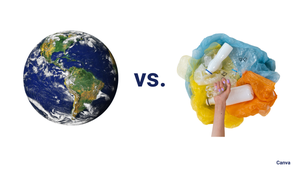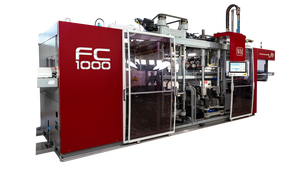The Klear Can from Milacron Holdings Corp. (Cincinnati, OH) recently passed a critical food safety test and is undergoing further testing with a number of select prospects.
October 27, 2015
The Klear Can from Milacron Holdings Corp. (Cincinnati, OH) recently passed a critical food safety test and is undergoing further testing with a number of select prospects.
Milacron’s Klear Can technology is an ideal alternative to metal cans for fruits, vegetables, soups, meats and other products. It uses the same filling, seaming and retorting machinery as metal cans so minimal downstream investment is required. Manufacturers can also produce/mold cans at the filling site (through the wall operations), be cost competitive to the metal can, and allow brand owners to demonstrate quality of the product to consumers.
 Before a new food or beverage container can be used commercially, the container has to pass a universally accepted series of testing for potential leakage of the double seam or the container structure. The standard test is a Biotest, which is a comparative method of examining leakage rates of a container or its seals. Double seaming is a metal forming process, which utilizes a seaming chuck, which fits the end being sealed onto the container.
Before a new food or beverage container can be used commercially, the container has to pass a universally accepted series of testing for potential leakage of the double seam or the container structure. The standard test is a Biotest, which is a comparative method of examining leakage rates of a container or its seals. Double seaming is a metal forming process, which utilizes a seaming chuck, which fits the end being sealed onto the container.
There are two steps to this process: A first operation seaming roll, which rolls the end curl material which is lined with a flexible compound onto the flange material of the container and; a second operation roll that irons out the resultant double seam formed between the end material and compound and the body material producing a hermetically sound seal.
While the double seaming principle may appear simple, it includes a wide range of factors, which can influence the double seam performance and integrity. The double seam is the most complex and critical factor in ensuring that the seal between the can end, the can end compound and the body material will withstand processing temperatures up to 121 degrees centigrade. The seal must also endure external factors related to the retorting process and handling without allowing a leakage path to form which could allow micro-organisms to enter or in the case of a beverage container, internal pressures to vent.
After conducting demanding Biotests on the functionality of the Klear Can’s easy open double seamed lid process, it has been determined that this innovative container is suitably and safely sealed. Field testing for the Klear Cam continues in Belgium where they have been filled with vegetables in an isolated environment and are ready for market trials. Consumer sampling tests have also been conducted with Klear Cans being filled with fruit.
Milacron Vice President and General Manager Co-injection Systems, Steve Morris stated, “We are extremely pleased with the progress of our Klear Can product. It continues to make impressive strides towards market readiness with major end users now getting involved in marketing tests. We feel this product and our equipment is another example of powerful, reliable solutions that meet unique customer needs.”
About the Author(s)
You May Also Like


